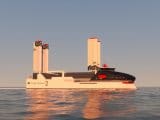
New catalyst for hydrogen fuel cells will propel the tech into the mainstream
February 9, 2022Cornell chemists have discovered a new catalyst far cheaper than platinum but with comparable reactions.
Chemists from Cornell have discovered a nonprecious metal derivative class capable of catalyzing reactions in hydrogen fuel cells at about platinum’s level, but with a far lower price tag.
This discovery can help to bring the zero-emission tech to a more practical and efficient level.
The findings help to show how hydrogen fuel cells have the potential for efficiently powering generators, cars, and aircraft, among other applications, without greenhouse gas emissions.
“These less expensive metals will enable wider deployment of hydrogen fuel cells,” said Héctor D. Abruña, the Department of Chemistry and Chemical Biology in the College of Arts and Sciences’ Émile M. Chamot Professor. “They will push us away from fossil fuels and toward renewable energy sources.”
Along with research co-authors Francis DiSalvo, the John A. Newman emeritus professor of chemistry, Rui Zeng, a doctoral student, and Yao Yang Ph.D., Xiamen University visiting graduate student Huiqi Li, and Lauryn M. Gibb Ph.D., Abruña published their findings in the journal of Science Advances. It was published under the title “Nonprecious Transition Metal Nitrides as Efficient Oxygen Reduction Electrocatalysts for Alkaline Fuel Cells” on February 2.

The new catalyst helps to overcome one of the most expensive barriers for hydrogen fuel cells.
A vital part of the process in the cells is the oxygen reduction reaction (ORR), which is a notoriously sluggish process. Abruña’s nickname for it is “God’s collective punishment to electrochemistry”. Catalysts such as platinum and other precious metals help to speed up that process. Platinum is a top option as a catalyst because it conducts electricity, it can hold up to the acidic environment within the cell and will catalyze even the most temperamental reactions. However, it is also extremely expensive, driving up the cost of using H2 as a fuel.
While options based on iron or manganese had been promising as potential alternatives, the researchers found that a cobalt nitride catalyst was “the clear winner”, said Abruña. The catalyst has an efficiency in hydrogen fuel cells that is nearly identical to platinum with a price tag that is about 475 times cheaper.



 With over 15 years of reporting hydrogen news, we are your premier source for the latest updates and insights in hydrogen and renewable energy.
With over 15 years of reporting hydrogen news, we are your premier source for the latest updates and insights in hydrogen and renewable energy.
There have beens frequent reports during the last several years of these kinds of scientific breakthroughs in the quest to replace platinum. Then you never hear about them again. Let’s hope this one will prove to be the game changer.